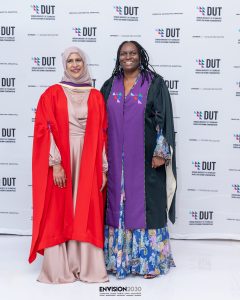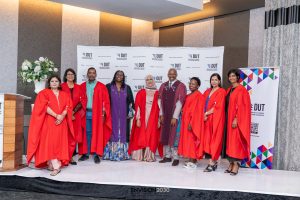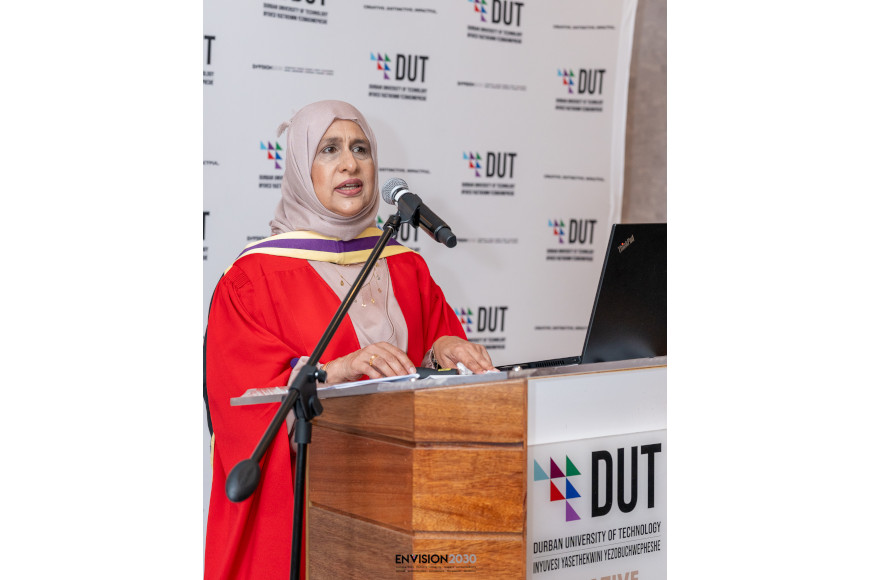Marking the significant milestone of her outstanding contribution to research, teaching and community engagement with the Department of Basic Medical Sciences was the order of the day at the inaugural professorial lecture of Professor Firoza Haffejee, an interim Head of Department (HOD) in the Department of Basic Medical Sciences.
The Durban University of Technology (DUT) played host to the prestigious inaugural professorial lecture of inaugurand, Professor Haffejee at the Coastlands Musgrave Hotel on Friday, 8 March 2024.
Welcoming the guests to the event was Programme Director, Dr Moeti Kgware, who is the Head Of Department, Community Health Studies, Faculty of Health Sciences. He further acknowledged Prof Haffejee’s hard work in achieving such a prestigious accolade.
Introducing the inaugurand was Prof Gugu Mchunu, the Executive Dean, Faculty of Health Sciences. She shared that Prof Haffejee lectures both undergraduate and postgraduate students in Epidemiology and Physiology. She has supervised over 20 master’s and doctoral students, as well as an international postdoctoral fellow.
She indicated that Prof Haffejee has a PhD in women’s health and is an avid researcher in public health, with particular emphasis on HIV, women’s health issues and disease prevention. She conveyed that Prof Haffejee has authored over 50 peer reviewed publications and three book chapters resulting in her receiving numerous research awards and then obtaining a NRF rating as an established researcher.
 “Over the years, Prof Haffejee has served on several university committees, including the Faculty Research Committee, Executive Research Committee, Postgraduate and Scholarships Committee and the Staff Higher Education Subsidy Committee. Serving a distinguished service to the broader University committee, students, as well as disadvantaged communities is notable,” commented Prof Mchunu.
“Over the years, Prof Haffejee has served on several university committees, including the Faculty Research Committee, Executive Research Committee, Postgraduate and Scholarships Committee and the Staff Higher Education Subsidy Committee. Serving a distinguished service to the broader University committee, students, as well as disadvantaged communities is notable,” commented Prof Mchunu.
After her introduction, Prof Haffejee was then invited to the stage to deliver her inaugural lecture titled: Propelling Prevention and Promotion in Public Health. Prof Haffejee first gave some insight into her several research journeys, a journey in basic sciences, which then progressed to applied science and then into the community and from there on to government level.
She then delved into the lecture, speaking on the burden of disease in South Africa which includes high rates of HIV and TB, elevated maternal and child mortality, as well as non-communicable diseases (NCD). She explained that the spectrum of her work ranges from the promotion of public health in order to reduce the overall burden of these infectious and NCD diseases, also strongly focusing on promotion efforts and including Community Engagement to disseminate the results to enhance health promoting behaviour change.
“ENVISION2030 encompasses student-centeredness as well as community outreach: my educational and research programmes will demonstrate these features. My epidemiological studies include those on HIV, maternal health, musculoskeletal problems and waterborne diseases. For the purpose of this lecture, I am focusing only on my work on HIV. Our epidemiological studies have shown that despite the HIV pandemic continuing into a number of decades, stigma around the infection still exists. This is particularly so among women. We have shown that perceived stigma has had a negative impact on HIV prevention efforts,” she stressed.
Prof Haffejee indicated that HIV testing services have been under-utilised due to perceived stigma, as has condom use among young vulnerable populations, especially females.
“Working among refugee women and other low socio-economic communities in the city centre has also indicated gender and power imbalances. Women often feel compelled to enter into relationships due to economic challenges, denying them the negotiating power for safe sex, hence increasing the risk for HIV transmission. These relationships are also associated with gender-based violence (GBV). Moreover, these women engage in transactional sex, sometimes for basic goods, such as food and shelter,” added Prof Haffejee.
Prof Haffejee emphasised that arising from these findings, she had shifted and broadened her research to include power relations, behaviour change and community engagement.
“My research team and I embarked on education drives in vulnerable communities and also amongst those who serve these communities as health care volunteers. This has resulted in an improvement of knowledge amongst this population. These health care volunteers promote voluntary testing and counselling of HIV, and also encourage the uptake of antiretrovirals among those infected. One of the most encouraging outcomes was an HIV positive woman who subsequently became a health care volunteer, who counsels others living with HIV and also advises young people on HIV prevention,” she commented.
Prof Haffejee further shared that she had incorporated her research into both the undergraduate and postgraduate curriculum, making it empirically based and involving students in the real world situations to prepare them for working in these complex communities. 
She spoke of her intervention studies for the prevention of HIV. She mentioned a second postgraduate intervention study, using video technology to improve uptake and usage skills for the female condom and a third study which is focusing on the use of social media as a tool in HIV health education and promotion.
“Overall my work speaks to sustainable development goal (SDG) 3 to ensure healthy lives and promote well-being and also to SDG 4 to provide a quality education and promote lifelong learning opportunities. Involving students in these real world situations, prepares them for working in these multifaceted communities and enhances their graduate attributes,” she said.
She then went on to thank every person that had played a role in helping her to achieve her research journey.
“The day Professor Mchunu announced my promotion last year, there was such a deafening applause in that room. It sounded like a room full of 100 and for the first time in my life I was left speechless. To my friends for the fun times over the years, my wonderful family. My mom who is not here with us because she’s in Saudi Arabia and unfortunately was unable to travel back on time for the lecture. Tahir, my son, thank you for everything. If it wasn’t for you encouraging me to do that PhD in the first place, nothing would have happened. So I thank you and I’m forever grateful for that. To my siblings, my brothers in law, my sister in law, my nieces, nephews, two of whom are here and my beautiful daughter in law and grandson. Thank you for everything, for all the love and the support that all of you have provided over the years. Thank you to all of you for being here and for sharing this momentous occasion with me. I am honoured,” she said.
A robust question and answer session then ensued followed by the closing remarks which were given by Dr Pavitra Pillay, Deputy Dean, Faculty of Health Sciences.
Pictured: Professor Firoza Haffejee
Photography: Khulasande Tshayile
Waheeda Peters

